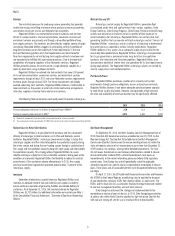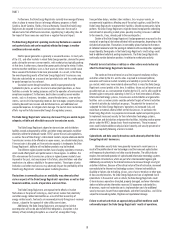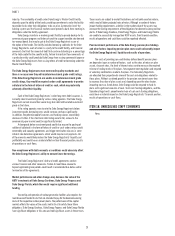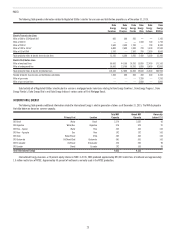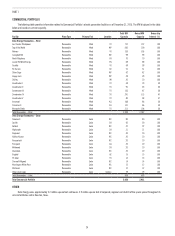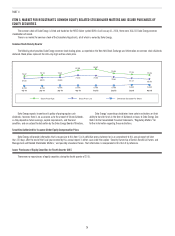Duke Energy 2015 Annual Report Download - page 36
Download and view the complete annual report
Please find page 36 of the 2015 Duke Energy annual report below. You can navigate through the pages in the report by either clicking on the pages listed below, or by using the keyword search tool below to find specific information within the annual report.
PART I
16
extent and timing of entry by additional competitors into the electric markets.
The Duke Energy Registrants cannot predict if or when they will be subject to
changes in legislation or regulation, nor can they predict the impact of these
changes on their financial position, results of operations or cash flows.
The Duke Energy Registrants’ businesses are subject to extensive federal
regulation that will affect their operations and costs.
The Duke Energy Registrants are subject to regulation by FERC, NRC,
EPA and various other federal agencies as well as the North American Electric
Reliability Corporation. Regulation affects almost every aspect of the Duke
Energy Registrants’ businesses, including, among other things, their ability
to: take fundamental business management actions; determine the terms
and rates of transmission and distribution services; make acquisitions; issue
equity or debt securities; engage in transactions with other subsidiaries and
affiliates; and pay dividends upstream to the Duke Energy Registrants. Changes
to federal regulations are continuous and ongoing. The Duke Energy Registrants
cannot predict the future course of regulatory changes or the ultimate effect
those changes will have on their businesses. However, changes in regulation
can cause delays in or affect business planning and transactions and can
substantially increase the Duke Energy Registrants’ costs.
The Dan River ash basin release could impact the reputation and financial
condition of the Duke Energy Registrants.
There is uncertainty regarding the extent and timing of future additional
costs and liabilities related to the Dan River ash basin release, including
the amount and extent of any pending or future civil penalties and resulting
litigation. These uncertainties are likely to continue for an extended period and
may further increase costs. Thus, the Dan River ash basin release could have
an adverse impact on the reputation of the Duke Energy Registrants and their
financial position, results of operations and cash flows.
The Duke Energy Registrants are subject to numerous environmental
laws and regulations requiring significant capital expenditures that can
increase the cost of operations, and which may impact or limit business
plans, or cause exposure to environmental liabilities.
The Duke Energy Registrants are subject to numerous environmental laws
and regulations affecting many aspects of their present and future operations,
including CCRs, air emissions, water quality, wastewater discharges, solid
waste and hazardous waste. These laws and regulations can result in
increased capital, operating and other costs. These laws and regulations
generally require the Duke Energy Registrants to obtain and comply with a wide
variety of environmental licenses, permits, inspections and other approvals.
Compliance with environmental laws and regulations can require significant
expenditures, including expenditures for cleanup costs and damages arising
from contaminated properties. Failure to comply with environmental regulations
may result in the imposition of fines, penalties and injunctive measures
affecting operating assets. The steps the Duke Energy Registrants could be
required to take to ensure their facilities are in compliance could be prohibitively
expensive. As a result, the Duke Energy Registrants may be required to shut
down or alter the operation of their facilities, which may cause the Duke Energy
Registrants to incur losses. Further, the Duke Energy Registrants may not be
successful in recovering capital and operating costs incurred to comply with
new environmental regulations through existing regulatory rate structures
and their contracts with customers. Also, the Duke Energy Registrants may
not be able to obtain or maintain from time to time all required environmental
regulatory approvals for their operating assets or development projects. Delays
in obtaining any required environmental regulatory approvals, failure to obtain
and comply with them or changes in environmental laws or regulations to more
stringent compliance levels could result in additional costs of operation for
existing facilities or development of new facilities being prevented, delayed or
subject to additional costs. Although it is not expected that the costs to comply
with current environmental regulations will have a material adverse effect on
the Duke Energy Registrants’ financial position, results of operations or cash
flows due to regulatory cost recovery, the Duke Energy Registrants are at risk
that the costs of complying with environmental regulations in the future will
have such an effect.
The EPA has recently enacted or proposed new federal regulations
governing the management of cooling water intake structures, wastewater and
CO2 emissions. These regulations may require the Duke Energy Registrants to
make additional capital expenditures and increase operating and maintenance
costs.
Duke Energy’s investments and projects located outside of the U.S. expose
it to risks related to the laws, taxes, economic and political conditions, and
policies of foreign governments. These risks may delay or reduce Duke
Energy’s realization of value from its international projects.
Duke Energy currently owns and may acquire and/or dispose of material
energy-related investments and projects outside the U.S. The economic,
regulatory, market and political conditions in some of the countries where Duke
Energy has interests may impact its ability to obtain financing on suitable terms.
Other risks relate to its customers’ ability to honor their obligations with respect
to projects and investments, delays in construction, limitations on its ability
to enforce legal rights, and interruption of business, as well as risks of war,
expropriation, nationalization, renegotiation, trade sanctions or nullification of
existing contracts and changes in law, regulations, market rules or tax policy.
OPERATIONAL RISKS
The Duke Energy Registrants’ results of operations may be negatively
affected by overall market, economic and other conditions that are beyond
their control.
Sustained downturns or sluggishness in the economy generally affect
the markets in which the Duke Energy Registrants operate and negatively
influence electricity operations. Declines in demand for electricity as a result of
economic downturns in the Duke Energy Registrants’ regulated electric service
territories will reduce overall sales and lessen cash flows, especially as industrial
customers reduce production and, therefore, consumption of electricity. Although
the Duke Energy Registrants’ regulated electric business is subject to regulated
allowable rates of return and recovery of certain costs, such as fuel, under
periodic adjustment clauses, overall declines in electricity sold as a result of
economic downturn or recession could reduce revenues and cash flows, thereby
diminishing results of operations. Additionally, prolonged economic downturns
that negatively impact the Duke Energy Registrants’ results of operations and
cash flows could result in future material impairment charges to write-down the
carrying value of certain assets, including goodwill, to their respective fair values.
The Duke Energy Registrants also sell electricity into the spot market or
other competitive power markets on a contractual basis. With respect to such
transactions, the Duke Energy Registrants are not guaranteed any rate of return
on their capital investments through mandated rates, and revenues and results
of operations are likely to depend, in large part, upon prevailing market prices.
These market prices may fluctuate substantially over relatively short periods
of time and could reduce the Duke Energy Registrants’ revenues and margins,
thereby diminishing results of operations.
Factors that could impact sales volumes, generation of electricity and
market prices at which the Duke Energy Registrants are able to sell electricity
are as follows:
• weather conditions, including abnormally mild winter or summer
weather that cause lower energy usage for heating or cooling purposes,





